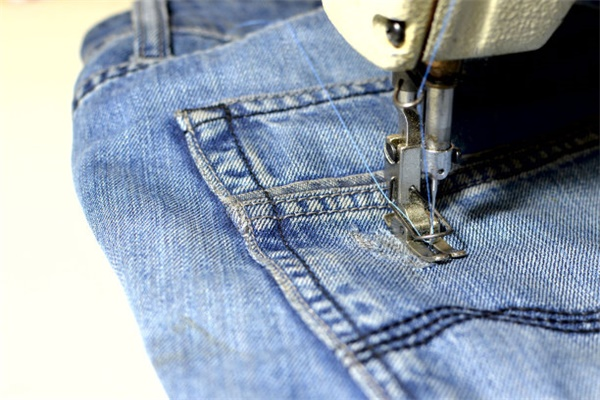Biodegradable Custom Denim:Compostable Threads & Natural Fibers
Introduction
The fashion industry is undergoing a significant transformation as sustainability becomes a top priority for brands and consumers alike. Among the most notable innovations is the development of biodegradable custom denim, crafted using compostable threads and natural fibers. This revolutionary approach addresses the environmental impact of traditional denim production, which often relies on synthetic materials, toxic dyes, and excessive water consumption. By shifting toward biodegradable alternatives, the denim industry can reduce waste, lower carbon footprints, and promote circular fashion.

This article explores the key components of biodegradable denim, including compostable threads, natural fibers, and ecofriendly dyeing techniques. It also examines the benefits, challenges, and future prospects of sustainable denim production.
The Environmental Impact of Traditional Denim
Conventional denim manufacturing is resourceintensive, requiring vast amounts of water, energy, and chemicals. A single pair of jeans can consume over 1,800 gallons of water throughout its lifecycle, from cotton cultivation to dyeing and finishing. Additionally, synthetic threads, such as polyester, contribute to microplastic pollution, while chemical dyes contaminate water sources.
The durability of denim, once considered an advantage, has become an environmental liability. Millions of discarded jeans end up in landfills each year, where synthetic fibers take centuries to decompose. To combat these issues, forwardthinking brands are embracing biodegradable alternatives that minimize harm to the planet.
Compostable Threads: A Sustainable Alternative
One of the most critical components of biodegradable denim is the thread used in stitching. Traditional denim relies on polyester or nylon threads, which are derived from petroleum and do not break down naturally. In contrast, compostable threads are made from organic materials such as:
Organic Cotton Thread: Grown without synthetic pesticides, organic cotton thread decomposes naturally, leaving no toxic residues.
Hemp Thread: Known for its strength and durability, hemp is a fastgrowing crop that requires minimal water and no chemical fertilizers.
PLA (Polylactic Acid) Thread: Derived from fermented plant starch (usually corn), PLA is a biodegradable alternative to synthetic threads.
These compostable threads ensure that when a pair of jeans reaches the end of its life, the entire garment—not just the fabric—can decompose safely.
Natural Fibers for Biodegradable Denim
The foundation of sustainable denim lies in the choice of fibers. While conventional denim primarily uses cotton, even organic cotton has limitations in terms of water usage. To create fully biodegradable denim, brands are experimenting with alternative natural fibers:
1. Organic Cotton
Though still waterintensive, organic cotton eliminates harmful pesticides and synthetic fertilizers, making it a more sustainable option than conventional cotton. When untreated with chemical finishes, organic cotton denim can biodegrade efficiently.
2. Hemp
Hemp is one of the most ecofriendly fibers available. It grows rapidly, requires little water, and naturally resists pests, eliminating the need for pesticides. Hemp denim is durable, breathable, and fully biodegradable.
3. Linen
Made from flax plants, linen is another excellent choice for biodegradable denim. It is lightweight, strong, and decomposes without releasing harmful substances.
4. Tencel (Lyocell)
Derived from sustainably sourced wood pulp, Tencel is produced in a closedloop process that recycles water and solvents. While not entirely natural like hemp or linen, Tencel is biodegradable under the right conditions.
EcoFriendly Dyeing and Finishing Techniques
Traditional indigo dyeing involves toxic chemicals and excessive water usage. Sustainable denim brands are adopting innovative dyeing methods to reduce environmental harm:
Natural Dyes: Plantbased dyes, such as those derived from indigofera, madder root, or walnut shells, provide vibrant colors without synthetic chemicals.
Waterless Dyeing: Technologies like foam dyeing or CO₂ dyeing significantly reduce water consumption.
Ozone Washing: This technique fades denim using ozone gas instead of water and harsh chemicals.
Additionally, biodegradable denim avoids synthetic finishes like resin coatings or plasticbased elastane, ensuring the fabric remains compostable.
The Benefits of Biodegradable Custom Denim
1. Reduced Landfill Waste – Unlike synthetic denim, biodegradable jeans break down naturally, reducing longterm waste accumulation.
2. Lower Carbon Footprint – Natural fibers and compostable threads require less energy to produce than petroleumbased alternatives.
3. NonToxic Decomposition – Without harmful chemicals, biodegradable denim safely returns to the earth without polluting soil or water.
4. Customization with a Conscience – Brands offering custom denim can now provide personalized fits and designs without compromising sustainability.
Challenges and Considerations
Despite its advantages, biodegradable denim faces several challenges:
Durability Concerns – Natural fibers may not last as long as synthetic blends, requiring a balance between longevity and biodegradability.
Higher Production Costs – Sustainable materials and ethical labor practices often increase manufacturing expenses.
Consumer Awareness – Many shoppers are unaware of biodegradable options, necessitating education and marketing efforts.
The Future of Biodegradable Denim
As technology advances, the production of biodegradable denim will become more efficient and costeffective. Innovations such as microbial dyeing, regenerative agriculture, and zerowaste pattern cutting will further enhance sustainability.
Leading denim brands are already incorporating biodegradable elements into their collections, signaling a shift toward ecoconscious fashion. By supporting these initiatives, consumers can drive demand for greener alternatives and accelerate the industry’s transition to sustainability.
Conclusion
Biodegradable custom denim represents a groundbreaking step toward a more sustainable fashion industry. By utilizing compostable threads, natural fibers, and ecofriendly dyeing techniques, brands can create stylish, durable jeans that leave no harmful footprint. While challenges remain, the growing demand for ethical fashion ensures that biodegradable denim will play a pivotal role in shaping the future of apparel.
As consumers, choosing biodegradable denim is not just a fashion statement—it’s a commitment to protecting the planet for future generations.
Global logistics
It can be shipped worldwide
About the MOQ
Minimum order quantity of 200 pieces
Support 24/7
Call us:(+86)138 0277 1794
Free sample
200 pieces MOQ Free sample

Customized product message